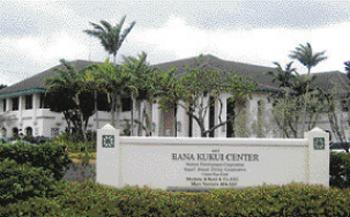LIHU‘E — The Kaua‘i Island Utility Cooperative on Tuesday filed a notice with the Hawai‘i Public Utilities Commission of its intent to seek an increase to its current base rate of 17.5 cents per kilowatt-hour, which would mark the first
LIHU‘E — The Kaua‘i Island Utility Cooperative on Tuesday filed a notice with the Hawai‘i Public Utilities Commission of its intent to seek an increase to its current base rate of 17.5 cents per kilowatt-hour, which would mark the first base rate increase in the cooperative’s 13-year history.
“A base rate increase may be needed at this time to provide KIUC with financial stability during these difficult times and to meet various challenges on the horizon,” President and CEO Randy Hee said in a press release.
In an interview at KIUC headquarters, Hee said the amount of the rate increase has not yet been determined and that consumers could actually end up paying less in total utility costs when fuel prices are high because KIUC plans to eliminate an incremental surcharge that ties some of KIUC’s revenue to fuel costs by rewarding increased efficiency.
The estimated 10 percent surcharge fluctuated wildly from the 31-cent-per-kilowatt-hour energy rate adjustment clause that was present in August when a barrel of diesel oil cost upwards of $180 to the energy rate adjustment clause in January at less than 7 cents per kilowatt-hour. A barrel of diesel costs less than $70 now.
However, because KIUC has not yet announced the proposed rate increase, the oil price threshold at which the change would benefit members can not be calculated.
“The rate design studies have not been completed, so it is too early to say how much the base rate will be adjusted,” Hee said in the release, adding that different studies are underway to determine the revenues needed for KIUC to remain financially stable, as well as to determine a rate structure that will assist KIUC in shifting its reliance away from fossil fuels.
Chief Financial Officer David Bissell said in the interview that the change would primarily serve to stabilize the cooperative’s revenue stream and would allow it to make good on its payments to state agencies.
“KIUC would prefer to not be financially dependent on fuel prices,” he said.
The incentive-based model was an “old concept, a 1996 concept” and that as a cooperative, KIUC does not need any financial incentive to operate efficiently because its goal is to keep rates low for members and not to turn a profit, Hee said.
Asked about KIUC’s long-term financial health, Hee and Bissell said they expected the company to be around for quite awhile.
“This is not ‘the sky is falling’ by any means,” Bissell said.
Asked if they were concerned about the timing of the announcement — elections for new board members are occurring this month — Bissell said the timing is “driven by nearly unprecedented economic decline as well as an unprecedented drop in oil prices” that accelerated the process from the original plan of filing notice later in 2009 or beyond.
Hee agreed, saying, “We wrestled with (the announcement’s impact on the elections) because it has impact on existing board members, but we decided it’s something we needed to do as quickly as we can. The key issue here is the financial stability of our co-op.”
Furthermore, because of the PUC’s rules — official paperwork for the rate increase can not be filed for at least 60 days after the notice of intent, according to KIUC officials — potential new board members will have an opportunity to offer input into the decision-making process and could even nix the plan before it moves forward.
Should KIUC officially propose the increase, the PUC would have a maximum of 11 months to authorize interim rate relief, KIUC said. A full approval of the increase could take up to another year or more.
•Michael Levine, staff writer, can be reached at 245-3681 (ext. 252) or via e-mail at mlevine@kauaipubco.com


